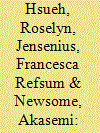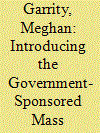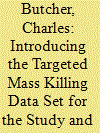|
|
|
Sort Order |
|
|
|
Items / Page
|
|
|
|
|
|
|
| Srl | Item |
| 1 |
ID:
131678


|
|
|
| 2 |
ID:
187559


|
|
|
|
|
| Summary/Abstract |
This article introduces the Government-Sponsored Mass Expulsion (GSME) dataset documenting cross-border mass expulsion episodes around the world from 1900 to 2020. This new dataset focuses on mass expulsion policies in which governments systematically remove ethnic, racial, religious or national groups, en masse. The GSME dataset disaggregates mass expulsion from other exclusionary politics concepts to isolate policies of intentional group-based population removal. This allows for a systematic examination of governmental expulsion policies, distinct from policies aimed at annihilation (genocide), control (massacre) or cultural elimination (coercive assimilation). The GSME dataset documents 139 expulsion episodes since 1900, affecting over 30 million citizens and non-citizens across all world regions. The data are drawn from archival research conducted at the United Nations High Commissioner for Refugees and the International Committee of the Red Cross, as well as secondary sources and extant datasets. This article presents an empirical overview of the data including information on the expelling country, onset, duration, region, scale, category of persons expelled, and frequency. Although mass expulsion is a rare event, it is a reoccurring rare event. Its consistent use – with over two million people expelled in the last five years alone – demands additional empirical and theoretical investigation. The GSME dataset contributes to the study of exclusionary politics as a dependent variable, but it also offers promise as an explanatory variable for those studying phenomena affected by mass expulsion.
|
|
|
|
|
|
|
|
|
|
|
|
|
|
|
|
| 3 |
ID:
173141


|
|
|
|
|
| Summary/Abstract |
This article describes a new data set for the study of genocide, politicide, and similar atrocities. Existing data sets have facilitated advances in understanding and policy-relevant applications such as forecasting but have been criticized for insufficient transparency, replicability, and for omitting failed or prevented attempts at genocide/politicide. More general data sets of mass civilian killing do not typically enable users to isolate situations in which specific groups are deliberately targeted. The Targeted Mass Killing (TMK) data set identifies 201 TMK episodes, 1946 to 2017, with annualized information on perpetrator intent, severity, targeted groups, and new ordinal and binary indicators of genocide/politicide that can serve as alternatives to existing measures. Users are also able to construct their own indicators based on their research questions or preferred definitions. The article discusses the concept and operationalization of TMK, provides comparisons with other data sets, and highlights some of the strengths and new capabilities of the TMK data.
|
|
|
|
|
|
|
|
|
|
|
|
|
|
|
|
|
|
|
|
|